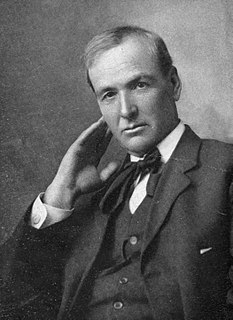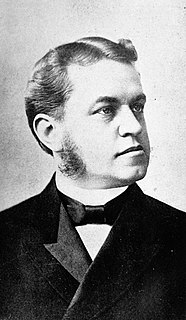A Quote by Herodotus
The man who has planned badly, if fortune is on his side, may have had a stroke of luck; but his plan was a bad one nonetheless.
Related Quotes
The man who has given himself to his country loves it better; the man who has fought for his friend honors him more; the man who has labored for his community values more highly the interests he has sought to conserve; the man who has wrought and planned and endured for the accomplishment of God's plan in the world sees the greatness of it, the divinity and glory of it, and is himself more perfectly assimilated to it.
Now, in economic crises times, the kind of things you're looking at is it's generally harder to get capital, revenue growth may be more, revenue lines may be unstable or growth may be less easy to predict that you're going to get to. And so what you do is you take a certain conservative approach of when, as all entrepreneurs should do, you plan for both good luck and bad luck, you put extra time on, "Okay, if I have bad luck, what do I do about that?"
In whatever area in life one may meet the challenges of courage, whatever may be the sacrifices he faces if he follows his conscience - the loss of his friends, his fortune, his contentment, even the esteem of his fellow men - each man must decide for himself the course he will follow. The stories of past courage can define that ingredient - they can teach, they can offer hope, they can provide inspiration. But they cannot supply courage itself. For this each man must look into his own soul.
It is a proverbial expression that every man is the maker of his own fortune, and we usually regard it as implying that every man by his folly or wisdom prepares good or evil for himself. But we may view it in another light, namely, that we may so accommodate ourselves to the dispositions of Providence as to be happy in our lot, whatever may be its privations.
Never do I argue with a man with a desire to hear him say what is wrong, or to expose him and win victory over him. Whenever I face an opponent in debate I silently pray - O Lord, help him so that truth may flow from his heart and on his tongue, and so that if truth is on my side, he may follow me; and if truth be on his side, I may follow him.
Writers on the subject of August Strindberg have hitherto omitted to mention that he could not write. ... Strindberg, who was neither a good nor a wise man, had a stroke of luck. He went mad. He lost the power of inhibition. Everything down to the pettiest suspicion that the dog had been given the leanest mutton chop, poured out of his lips. Men of his weakness and sensuality are usually, from their sheer brutishness, unable to express themselves. But Strindberg was mad and articulate. That is what makes him immortal.
The right merchant is one who has the just average of faculties we call common sense; a man of a strong affinity for facts, who makes up his decision on what he has seen. He is thoroughly persuaded of the truths of arithmetic. There is always a reason, in the man, for his good or bad fortune in making money. Men talk as if there were some magic about this. He knows that all goes on the old road, pound for pound, cent for cent - for every effect a perfect cause - and that good luck is another name for tenacity of purpose.
Strange is the vigour in a brave man's soul. The strength of his spirit and his irresistible power, the greatness of his heart and the height of his condition, his mighty confidence and contempt of danger, his true security and repose in himself, his liberty to dare and do what he pleaseth, his alacrity in the midst of fears, his invincible temper, are advantages which make him master of fortune.
A word is all it takes to put a man in prison, or to seize his property, or to end his life. A saber might be stopped by a shield. A bullet might be dodged by a stroke of luck. But you can't dodge a word. If one is flung at you, it will hit its mark unerringly. No Garritt, there's nothing in the world more dangerous than talk.
The rich man, when contributing to a permanent plan for the education of the poor, ought to reflect that he is providing for that of his own descendants; and the poor man who concurs in a provision for those who are not poor that at no distant day it may be enjoyed by descendants from himself. It does not require a long life to witness these vicissitudes of fortune.








































